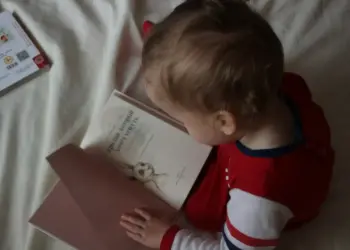“How can I help my child who isn’t interested in books and can’t sit still during story-time?“ This is a question I’m often asked, and it has prompted this series, How to Engage Reluctant Readers. This will be the first in a series of five posts featuring practical strategies for parents and educators who would like to help their children engage positively in books and reading.

The strategies and ideas featured in this series are all based on my anecdotal experience in the classroom. I’ve used all of these strategies with different children over time. So, please keep in mind that some will work for your child, and some may not.
- Week One: How to Engage Reluctant Readers- General Strategies for children of all ages
- Week Two: How to Engage Reluctant Readers- Strategies for young children and pre-readers
- Week Three: How to Engage Reluctant Readers- Strategies for older children and beginner readers
- Week Four: How to Engage Reluctant Readers- Strategies for tweens and independent readers
- Week Five: How to Engage Reluctant Readers- Strategies for the classroom
Reasons for reading reluctance
There is an endless number of reasons why children become reluctant readers. Some children simply lack an interest in the books they are being offered; some children find it difficult to sit and concentrate for long periods of time; some children are kinaesthetic learners and prefer a hands-on approach to learning rather than through books; some children find reading difficult and tiring and learn to dislike books; some children haven’t had the opportunity to read books before starting school; some children would rather spend their time doing other activities………………………
Showing a reluctance to sit and read a story can actually be common during particular stages of development (particularly for toddlers and adolescents). But, reluctance can also be a sign of underlying issues. Sometimes the problems can be solved quite easily and at other times the cause can be much more complicated (e.g. sight problems, learning difficulties). I would suggest talking to your child’s teacher or doctor if your child’s reluctance continues for an extended period of time or if none of the strategies offered in this series seem to make a difference.

General strategies for children of all ages.
- REMEMBER: As adults, we can sometimes take the skill of reading for granted because we’ve been doing it for such a long time. But, it’s important to remember that reading is hard work, especially for children with learning difficulties. It requires work, practise and concentration and it can be tiring.
- Create an inviting space for your child to read, or encourage them to read in a place of interest (e.g. cubby house/park/beach). You can find a few more ideas in our photo gallery.
- Don’t make reading a chore by forcing your child to read when they’re not interested, and definitely don’t pull them away from play; otherwise they may begin to resent books and reading
- Be consistent with reading in your home. Reading daily is ideal but it doesn’t have to be at the same time everyday
- Be relaxed when you read with your child, even if they are squirmy or seem uninterested. Let your child lead the way a little, and be willing to cut a story-time short and come back to the book at a later time.
- Leave books in accessible places for your child to explore at their own leisure. You might learn about what types of books attract your child’s attention
- Give your child the chance to choose their own books to read. Visits to the library are a perfect way to provide this opportunity for your child, and children will be very keen to borrow books if they have their own library card.
- Help your child to find books that feature people, places or topics that are of special interest to them.
- Persist with story-time even if your child resists. Don’t give them the stigma of being a non-reader. Instead, give them time to develop an enjoyment for books.
- Be a role-model and let your children see you reading too
- Talk to your child about reading. Ask him/her questions and find out what books they enjoy and why they don’t like a particular book
- Help your child to develop a love for books by enjoying them in a variety of interesting ways. We’ve created this wonderful list of ways to enjoy and celebrate books.













